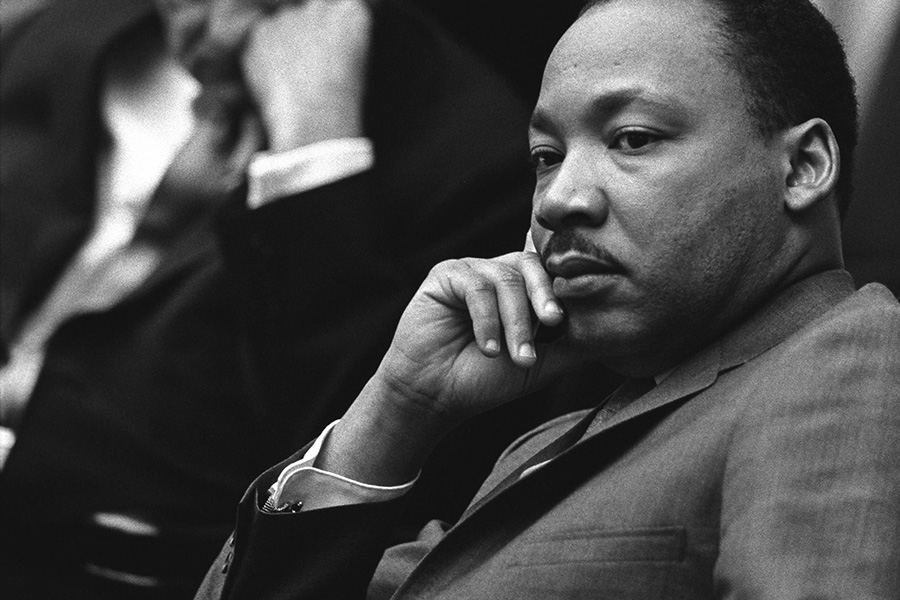MLK Day forum focuses on health disparities in 2021
Disparities in mental health, drug research, health benefits and dental care still exist in today’s America.
Janel Shoun-Smith | 615.966.7078 |

Originally post on Jan. 29.
In a Jan. 19 observance to recognize and celebrate the life of Martin Luther King Jr., Lipscomb University took a deeper dive into an issue of racial inequity that is currently on everyone’s minds as the Covid-19 pandemic ravages the globe: the continuation of health disparities in the U.S.
A four-speaker panel outlined the challenges the nation still faces in terms of providing equitable health care service in four different areas: mental health, scientific research, dental care and health care benefits for the self-employed.
These speakers were joined by three local teen spoken word poets, presented by Southern Word, a national nonprofit leader in the spoken word education field, serving more than 6,000 youth, 43 schools and eight Tennessee counties. Southern Word is focused on presenting thoughts on mental health and healing conversations in the nation’s classrooms this year.
“2020 was a very uncommon year,” noted event host Norma Burgess, Lipscomb’s associate provost of diversity, inclusion and special initiatives. “We experienced many events that brought to fore patterns of behavior that are often hidden beneath the surface in every phase of our lives.”
Among those patterns hidden beneath the surface and brought into view by the Covid-19 pandemic, are negative (and often inaccurate) attitudes toward therapeutic care for mental health, an under-representation of diverse communities in new drug trials and research, continued lack of affordable health insurance options for the self-employed and general misunderstanding of the importance of oral care for all.
Chris Gonzalez, director of Lipscomb’s marriage and family therapy master’s program and the Lipscomb Family Therapy Center, noted that mental health care overall is already undervalued in relation to physical health care because the symptoms and wounds of mental health disorders are often not able to be seen.
The pandemic has acerbated the unmet need for mental health care, he said.
“Right now one in five adults are having symptoms that meet the criteria for depression. One in 12 adults right now have a relationship with alcohol, drugs or prescript medication that meets the criteria for substance use disorder. Suicide is the tenth leading cause of death for all ages and the second leading cause of death in young adults. Right now suicide is more common than murder,” he said.
Despite this overwhelming need, the pandemic has provided one silver lining of sorts: that virtually all mental health providers have been forced to begin providing services through telehealth, which has eliminated many of the barriers to obtaining treatment, including the lack of transportation, geographic distance, probative schedules and negative stigma, Gonzalez said.
Research over the past year has shown that therapy is just as effective in a virtual format as it is in-person, Gonzalez said. In addition, research has shown that each one of us can be a positive influencer in our personal relationships to encourage those we love and care for to seek out mental health treatment, he said.
Klarissa Hardy Jackson, assistant professor at the Eshelman School of Pharmacy at the University of North Carolina and a former member of the Lipscomb University faculty, researches drug metabolism to better understand the mechanisms and risk factors of adverse drug reactions and improve drug safety.
“Many of these factors have been well-studied among patients of European descent; however, less is known about differences in drug metabolism in people of African ancestry and other understudied populations,” she said. “A one-size fits all approach can lead to unexpected, adverse or harmful reactions in a patient or ineffective treatment. So it is important for research to include diverse patient populations.”
During the Covid-19 pandemic, not only have diverse populations been more adversely affected by the virus itself, but according to the Centers for Disease Control, Jackson said, African Americas and Hispanics are approximately four times more likely to be hospitalized due to Covid-19 and nearly three times more likely to die compared to non-Hispanic whites.
“We have also seen under-representation of African Americans in clinical trials for Covid-19 vaccines as well as Covid-19 treatments,” Jackson said. “Reports also indicate that black patients are less likely to receive life-saving treatments for Covid-19, such as Remdesivir.”
“These issues must be addressed, if we want to move forward into the future,” said Jackson. “Until we really get to the underlying cause of social inequities, we will just be treating the symptoms.”
Jacky Akbari, founder and national board chair of the nonprofit National Organization for Workforce (NOW) Diversity, noted that 2020 has brought a greater challenge for Americans as so many people have become unemployed, losing jobs that included health care benefits. Now those without health care include millions more of the unemployed as well the self-employed, entrepreneurs and those who work in the gig economy, which has always been an underinsured populace even before 2020.
The pandemic has shown us that in the future we must create support mechanisms for the gig economy workers and essential workers, who we now realize are the foundation of our economy, Akbari said.
As ways to reach out to underserved populations as health care practitioners, Gonzalez and Venetra Jones, a dentist with Castle Dental in Mount Juliet, recommended becoming involved with National Health Service Corps, the Indian Health Service or Remote Area Medical, which all have programs to incentivize health care for underserved populations in rural or heavily populated areas or on national reservation lands.